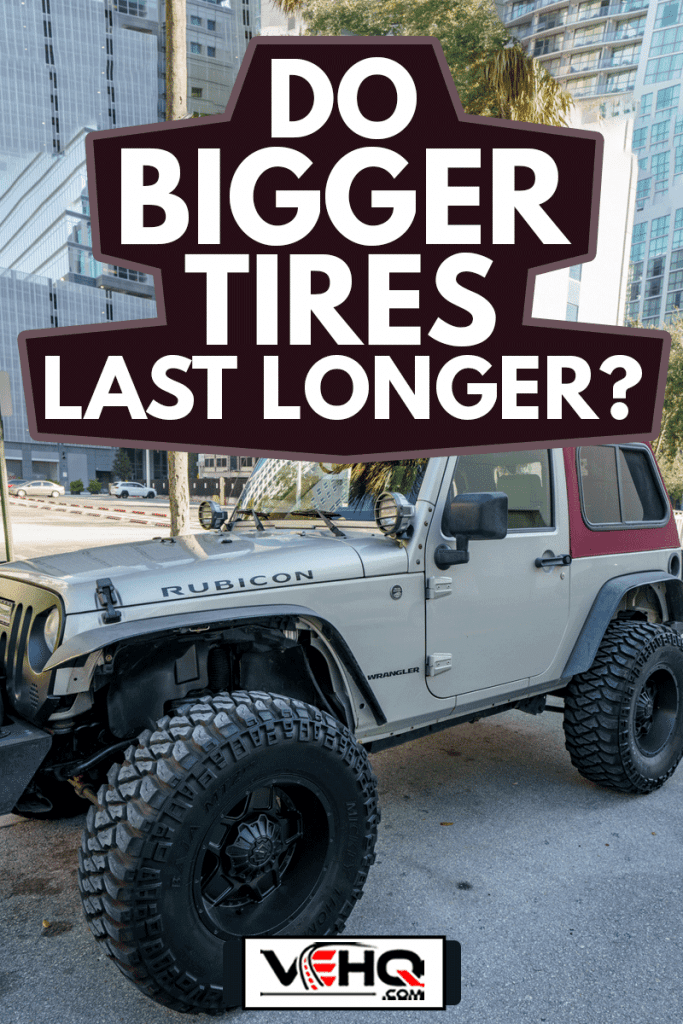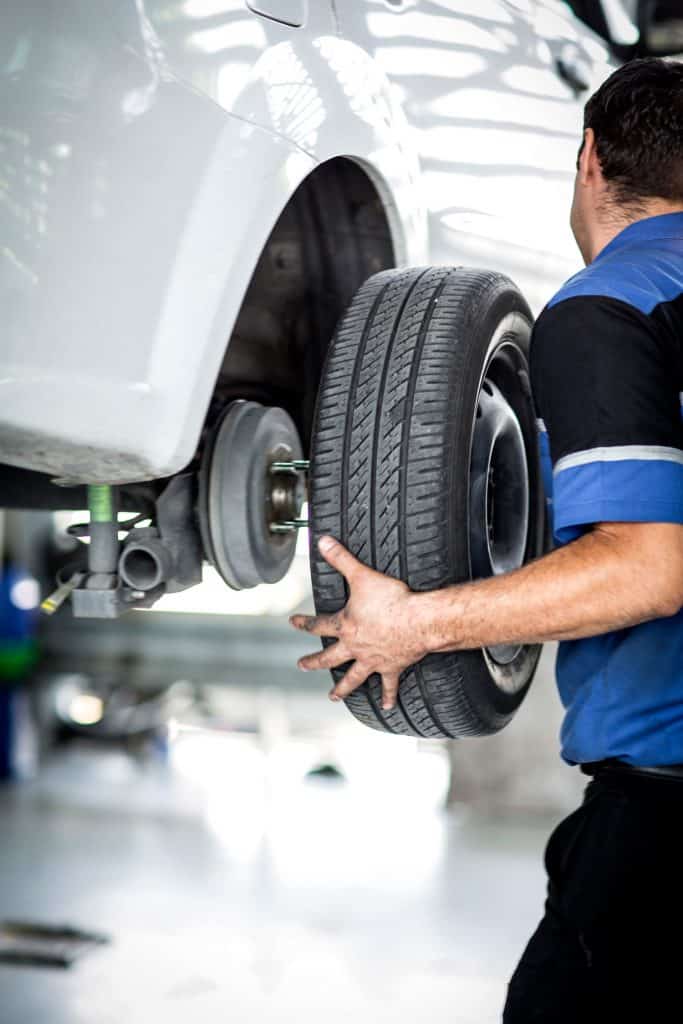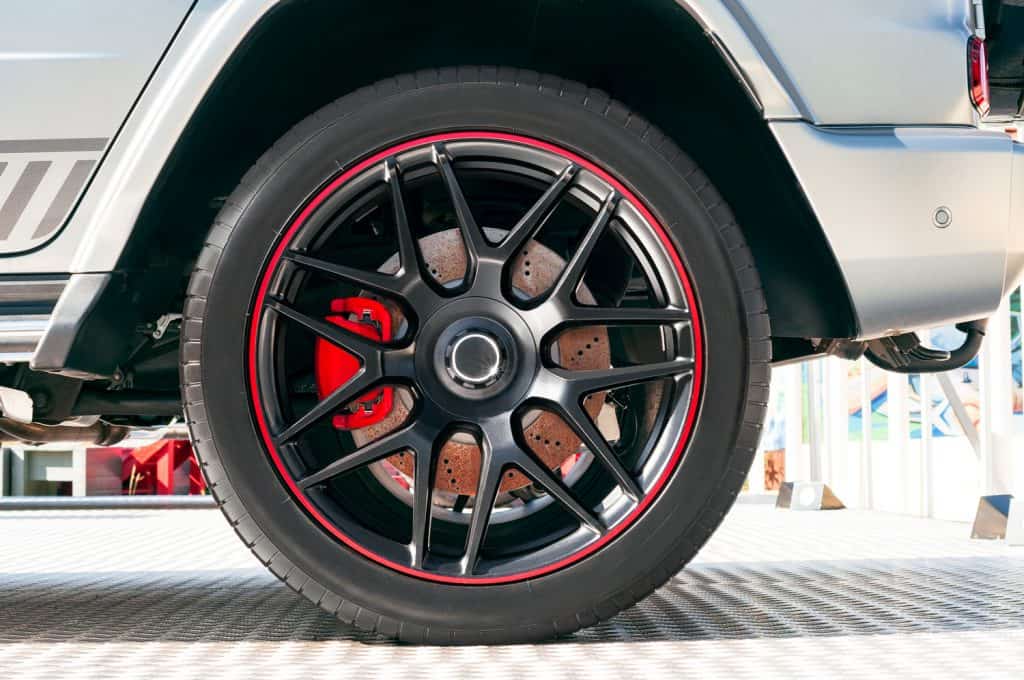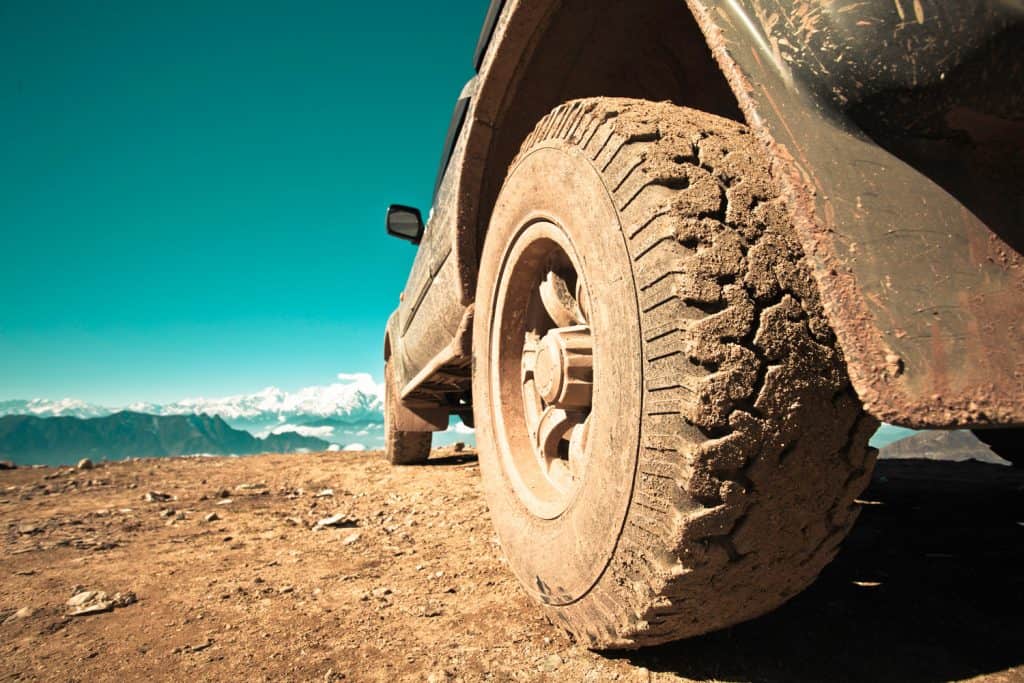One of the most popular topics in the world of car enthusiasts is tire size. Does bigger mean better? Do big tires last longer? Is there a specific reason for going with larger rubber than what you currently have on your vehicle? We have done the research on your behalf to answer this question.
Bigger tires last longer. Larger tires offer more stability and traction to your vehicle, which will result in minor wear and tear on the rubber. In addition, larger tires have more heat-absorbing mass, which will help them last longer. They also reduce the risk of hydroplaning and significantly increase your safety.
Depending on what type of vehicle you have, it may be a good idea to get a bigger set of tires. However, tires are an expensive purchase, and it's one that you don't want to do frequently. In this article, we will discuss the benefits of having bigger tires. In addition, we will discuss any downfalls of having bigger tires on your vehicle. Just keep reading!

Do Bigger Tires Last Longer?
Bigger tires do have their advantages. First off, bigger tires mean more traction when driving. Second, they have more mass which means they can absorb more heat in scorching conditions. Finally, more mass means that they take longer to wear down.
Many factors go into the life expectancy of tires, such as driver behavior and road conditions. Nonetheless, wider tires will last longer than narrow ones. However, it will depend on your vehicle if you can switch from a narrow tire to a wider one.
For example, if you own a sports car like a Porsche Cayenne or Mercedes AMG, you may need to make some other aftermarket changes to the vehicle before you can put on wider tires.

This may not always be the case, but you may also need to buy new wheels to get wider tires onto your vehicle. Adding a whole new setup with rims and tires can be pretty expensive.
So it's best to do your research and look into what might work. Then, reach out to a trustworthy tire shop like TireRama for a quote and recommendation.
In addition, you can contact your factory dealer for a tire quote. They might be able to put on a bigger tire without having to change the rims.
What are the benefits and drawbacks of wider tires?
There are many advantages of having wider tires on your vehicle. First, when the tire's width is increased, it can provide more stability when turning corners in wet conditions. This is because there will be less movement in the front wheels in relation to the rear wheels.
The wide tires also have higher ground clearance, so if you drive over something, the risk of getting a flat tire is decreased. In addition, these bigger tires can absorb more air pressure, so they offer a smoother ride and better handling capabilities.
On the other hand, wider tires require larger rims, which means that you won't use your original rims. If one were to get a flat tire and replace it with a smaller rim, the tire would no longer be compatible.
This means you'll have to replace all four tires if one gets a puncture, which can get quite expensive in time.
Also, a wider wheel may not fit a small car very well, which could mean replacing your entire set of wheels. Finally, these bigger tires take more effort to make, and the production costs are passed onto you, which ends up costing more in the long run.

Do bigger tires affect MPG?
Bigger tires do negatively affect fuel economy. Bigger tires are heavier, so the vehicle has to work harder to rotate them. This means that the car will use more gas when driving.
You will have to weigh your priorities on whether or not you want more stability and traction or if you want better fuel economy. However, unless you get ridiculously big tires, it shouldn't make a drastic change in your miles per gallon.
The size of the tire also affects the weight distribution within your vehicle, which can lead to increased wear and tear on other parts such as brake drums, chains, belts, bearings, etc. This results in you having to pay for extra repairs sooner than anticipated.
![]()
Do more expensive tires last longer?
Whether expensive tiers last longer than cheaper tires can be subjective because it depends on how one treats their vehicle.
For example, if you are doing burnouts or driving up rocky roads frequently, the tires will wear down more quickly. However, more expensive tires usually mean they are made out of a better rubber material.
It is good to talk to a tire specialist when shopping for tires. If you are looking at a tire that costs $50, it more than likely isn't going to last as long as a tire that costs $100.
Don't buy tires blindly just because the price is low. Do your research and talk to an expert. Sometimes you can find a set of tires that are a nice balance between price and quality.

Are bigger tires better for off-road?
Bigger tires are usually better for off-road driving because they have more traction. Also, bigger tires typically have a thicker tread to handle boulders, and sharp rocks are generally found when off-roading.
Therefore, if you are looking for a tire that can be used both on and off-road, it is crucial to find one with mixed terrain properties.
These tires will give a solid performance while driving in wet conditions and have enough treads, so they don't get stuck when climbing over rocks or up steep hillsides.
Keep in mind to check the tread of your tire before off-roading. Just because they are bigger doesn't mean that the tread is in good shape.
Also, be sure to bring an air compressor and a full-size spare in case of a flat tire. You don't want to be putting on a donut back in the hills.
What happens when you put bigger tires on your truck?
Putting bigger tires on a truck will make it look more intimidating and change how your vehicle handles. Also, putting on larger wheels can give you better clearance, so if you drive over something, the risk of getting a flat tire is decreased.
In addition, these bigger tires can absorb more air pressure, so they offer a smoother ride and better handling.
However, you don't want to go too big on your tires because this can lead to poor gas mileage, and it can make the vehicle harder to control.
Plus, if you choose a tire size that is drastically different from what was previously installed, it may require new shocks or struts, which can be pricey.

Will oversized tires affect transmission?
Oversized tires can affect the transmission of your vehicle. For example, if you have a set of oversized wheels and tires, more torque is being applied to the drivetrain, leading to problems with slipping or binding in transmissions.
Other effects of oversized tires
It may also cause issues for automatic locking hubs found on four-wheel-drive vehicles because they are created for much lower torque.
In addition, if you have a front-wheel-drive vehicle and your wheels rub against the fender wells, it could cause damage to other components such as suspension or brake parts which will lead to costly repairs for those components.
Lastly, oversized or wide-body tires can cause issues with how a vehicle is aligned. If you put on bigger wheels and need to get an alignment done, it won't compensate for how much wider these new tires are than what was originally installed.
This could lead to a loss in performance and handling, which can be dangerous if you drive on slick or icy roads.
To prevent these issues, it is best to get the tires installed by professionals who know all of the details that need to go into making sure your vehicle's alignment is correct with the new wheels and tires.
Final Thoughts
Overall, having bigger tires can be beneficial. You will get better stability and traction when driving in extreme weather conditions. In addition, they absorb heat better, so they will wear down slower than narrow tires.
However, the drawbacks include decreased gas mileage. Also, if you go too big, it can affect other mechanical parts of your vehicle. Lastly, getting bigger tires will be more expensive because they take more material to make.
In addition, you will more than likely have to get new rims in order to get bigger tires which be expensive. Weigh these pros and cons before making a buying decision and, as always, reach out to a tire specialist.
If you enjoyed this article, you might also like:
Should Tires Always Be Replaced In Pairs?
Do Tires Degrade Over Time? Even When Not Used?
Nitrogen In Tires: Pros And Cons
Did you put bigger tires on your vehicle? Tell us how you like them below!

I love big tire but they definitely doesn’t help with hydroplaning. less lb/ft^2. creating more ability for ice and water to break the friction.
friction force for dynamic = normal force x friction coefficient
like I said I love big tires but their benefit is clearance, smoother ride, not sinking in soft ground. honestly pizza cutters would be better for stopping hydroplaning if you want tall tires.